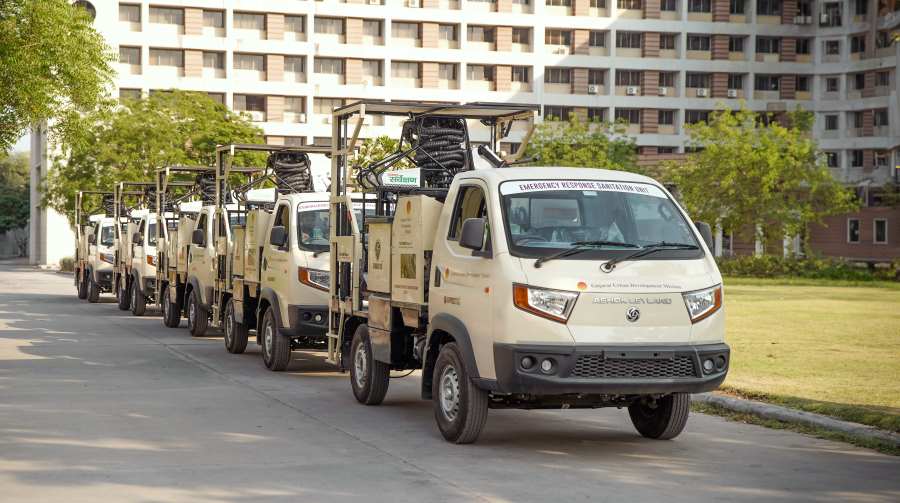Health
Gujarat Launches Robotic Solution to End Manual Scavenging

The Government of Gujarat has initiated a significant technological advancement to eliminate manual scavenging by deploying the Bandicoot Mobility+, an innovative robotic manhole cleaning system. This deployment, part of the Swachh Bharat Mission’s Emergency Response Sanitation Unit (ERSU) initiative, aims to enhance safety, hygiene, and dignity in urban sanitation operations across multiple Urban Local Bodies (ULBs).
The Bandicoot Mobility+ is a vehicle-integrated robotic solution designed to tackle the challenges associated with manual cleaning of manholes. Developed by Genrobotics, the system features precision robotic limbs, high-definition cameras, gas detection sensors, and a sealed waste management system. These features allow the machine to operate without the need for human entry into hazardous environments, thus significantly reducing risks to sanitation workers.
In a move to foster a more humane and technologically adept sanitation ecosystem, the Government of Gujarat plans to expand the use of Bandicoot Mobility+ statewide. The initiative reflects a growing commitment to ending manual scavenging in the region, under the banner of its #ManholeToMachineHole campaign.
Impact on Sanitation Workers and Urban Health
The deployment of robotic machines has already taken place in major cities, including Ahmedabad, Gandhinagar, and Surat. As part of its Corporate Social Responsibility (CSR) initiative, Coal India has contributed nine Bandicoot robots to these municipalities, facilitating a transition from high-risk manual tasks to the operation of advanced robotic systems.
“Workers who once carried out high-risk manual tasks are now being upskilled to operate robots, marking a dignified shift in their roles,” shared an ERSU sanitation worker from Himatnagar. The worker noted that the gas sensors in the Bandicoot provide alerts before any potential danger, enhancing safety during operations. The sealed system also prevents any spillage, making the process cleaner and safer.
Upendra P. Gadhvi, Chief Officer of Himatnagar Nagarpalika, emphasized the significant benefits of the robotic solution, stating, “It ensures the safety of our workers while improving efficiency and cleanliness.”
Wider Adoption and Future Prospects
The Bandicoot Mobility+ is not just limited to Gujarat; it has been implemented in over 300 cities across India, positively affecting the lives of more than 3,000 sanitation workers. While Kerala was the first state to adopt Bandicoot for manhole cleaning, other states, including Tamil Nadu, Andhra Pradesh, Maharashtra, Telangana, Haryana, and Punjab, have also integrated these robots into their sanitation systems.
The introduction of Bandicoot robots represents a pivotal step in the government’s vision to eradicate hazardous manual scavenging and promote mechanized cleaning. This initiative not only improves urban sanitation but also enhances the quality of life for sanitation workers, providing them with safer and more dignified employment opportunities.
As cities across India embrace this technological solution, the transformation of sanitation practices signifies a broader commitment to public health and urban development, paving the way for a cleaner and safer future.
-

 World5 months ago
World5 months agoSBI Announces QIP Floor Price at ₹811.05 Per Share
-

 Lifestyle5 months ago
Lifestyle5 months agoCept Unveils ₹3.1 Crore Urban Mobility Plan for Sustainable Growth
-

 Science4 months ago
Science4 months agoNew Blood Group Discovered in South Indian Woman at Rotary Centre
-

 World5 months ago
World5 months agoTorrential Rains Cause Flash Flooding in New York and New Jersey
-

 Top Stories5 months ago
Top Stories5 months agoKonkani Cultural Organisation to Host Pearl Jubilee in Abu Dhabi
-

 Sports4 months ago
Sports4 months agoBroad Advocates for Bowling Change Ahead of Final Test Against India
-

 Science5 months ago
Science5 months agoNothing Headphone 1 Review: A Bold Contender in Audio Design
-

 Top Stories5 months ago
Top Stories5 months agoAir India Crash Investigation Highlights Boeing Fuel Switch Concerns
-

 Business5 months ago
Business5 months agoIndian Stock Market Rebounds: Sensex and Nifty Rise After Four-Day Decline
-

 Sports4 months ago
Sports4 months agoCristian Totti Retires at 19: Pressure of Fame Takes Toll
-

 Politics5 months ago
Politics5 months agoAbandoned Doberman Finds New Home After Journey to Prague
-

 Top Stories5 months ago
Top Stories5 months agoPatna Bank Manager Abhishek Varun Found Dead in Well









